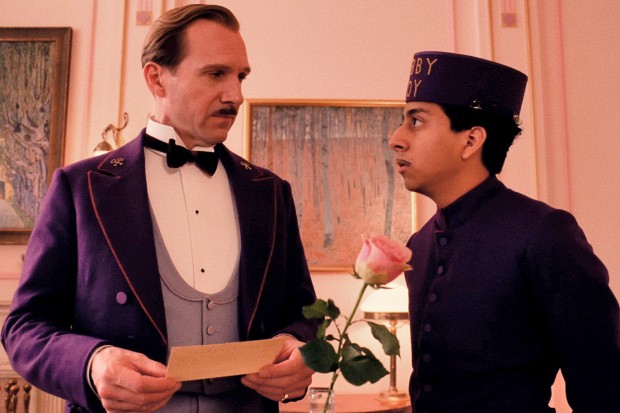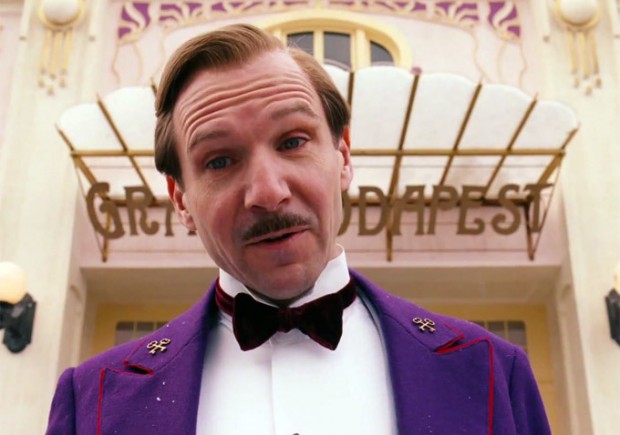By Kyle Osborne
Quirky.
Quirky, quirky, quirky.
There, I’ve gotten that out of the way before I even start. Has there ever been a film by director Wes Anderson that wasn’t deservedly described as “quirky”? And yet, that word has become too facile, too shopworn at this point. It also doesn’t do the auteur justice.
 In ‘The Grand Budapest Hotel’ Anderson does what he does best, he creates an entire universe in which his story and its attendant characters live. It’s a unique world that is both whimsical and hyper-real, the characters aren’t in on the joke because there is no joke–the films aren’t meant to be enjoyed “ironically.” I maintain (some disagree) that Anderson’s films are completely sincere, almost innocent. If the viewer doesn’t buy into them, that’s the viewer’s own fault, for Anderson is not asking the viewer to snicker from a place of detachment. No, he’s inviting the viewer to enter the world and co-exist with the characters.
In ‘The Grand Budapest Hotel’ Anderson does what he does best, he creates an entire universe in which his story and its attendant characters live. It’s a unique world that is both whimsical and hyper-real, the characters aren’t in on the joke because there is no joke–the films aren’t meant to be enjoyed “ironically.” I maintain (some disagree) that Anderson’s films are completely sincere, almost innocent. If the viewer doesn’t buy into them, that’s the viewer’s own fault, for Anderson is not asking the viewer to snicker from a place of detachment. No, he’s inviting the viewer to enter the world and co-exist with the characters.
And that’s why I love his movies. It’s almost become a joke that Anderson’s films are loved by pretentious or fawning critics, while the rest of the movie-going world shrugs. But the very valid reason that most critics fall in love with his quir—er, um, “eccentric” movies is because they stand out as being unlike the chaff. So many films are like each other, mostly in crappy ways. Anderson’s films are only comparable to his own catalog. There aren’t three movies that are kinda like “Moonrise Kingdom”, for instance.
And now I’ve stalled for three paragraphs without really getting much into the story of “The Grand Budapest Hotel.” I know. Sorry. Maybe it’s because I want you to just go through the door and experience Anderson’s keen eye for the minutia. On the surface the story is about the history of the hotel, and how it came to be owned by a mysterious old man played by F. Murray Abraham.
We flash back to 1930-ish, where a fussy Ralph Fiennes is the consummate Concierge, Gustave. Perhaps his character is a stand-in for Anderson, because no detail goes unnoticed by him. This has to be some of Fiennes’s, um, finest work. The character is a lover of language and poetry who often interrupts his verbal flights of fancy with a sudden “F*ck!”
He hires a new Lobby Boy, played by Tony Revolori, who becomes the quintessential student to the master. The relationship between the two and the road trip (well, rail trip) upon which they embark is where the laughs are.
 And that’s all I want to say about plot. What I really want to do is encourage you to go “full immersion” into Wes Anderson’s quir—I mean, “interesting” universe. Appreciate the heart that has gone into these characters and their story. It is a comedy and you will laugh. But as the laughter subsides, there is a residual tenderness that remains. And that’s the part that will stay with you for days.
And that’s all I want to say about plot. What I really want to do is encourage you to go “full immersion” into Wes Anderson’s quir—I mean, “interesting” universe. Appreciate the heart that has gone into these characters and their story. It is a comedy and you will laugh. But as the laughter subsides, there is a residual tenderness that remains. And that’s the part that will stay with you for days.
“The Grand Budapest Hotel” is rated “R”
